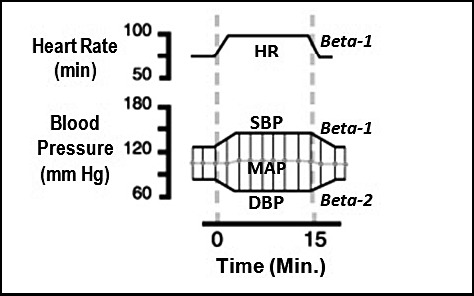Figure 7.

Cardiovascular effects of epinephrine.31 The following graph illustrates the typical cardiovascular response to epinephrine administered as a continuous intravenous infusion of 10 µg/min. (This is the amount contained in 1 mL of a 1 ∶ 100,000 concentration.) Epinephrine increases heart rate (HR) by activating beta-1 receptors in the sinoatrial node, the heart's normal pacemaker. It also activates beta-1 receptors on myocardial cells, increasing their contractility and increasing systolic blood pressure (SBP). However, it activates beta-2 receptors on systemic arteries producing vasodilation. This decline in arterial resistance produces a reduction in diastolic pressure (DBP). These effects result in little change of mean arterial pressure (MAP).
